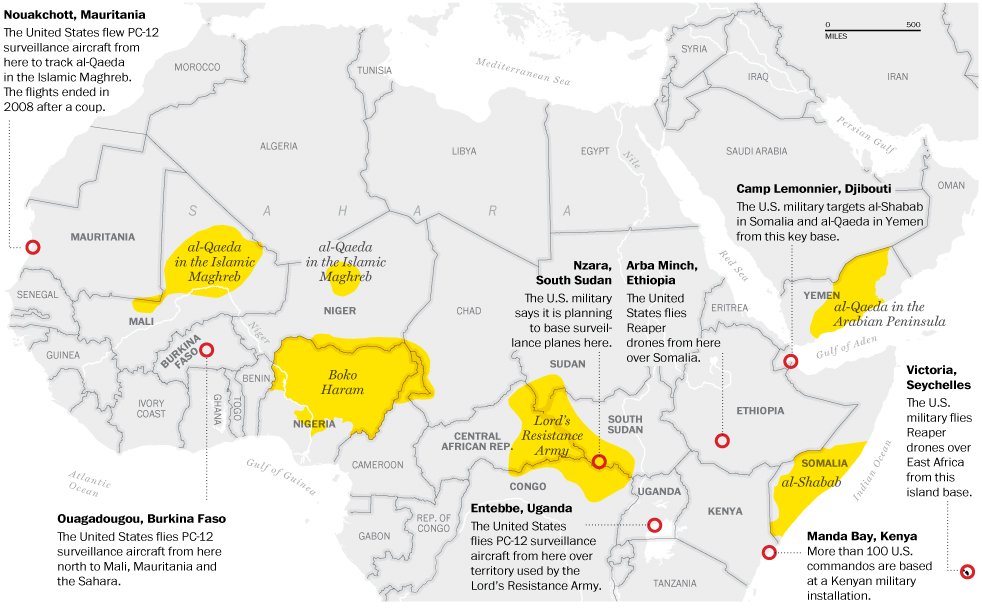Map of the day: AFRICOM's network of little "forts" grows
 Monday, June 18, 2012 at 10:29AM
Monday, June 18, 2012 at 10:29AM  Remember, back in 2007, when I wrote the Combined Joint Task Force-Horn of Africa piece for Esquire ("The Americans have landed"). I spoke o f two dozen little forts around Africa by 2012. Well, WAPO reports a good dozen or so mini-facilities used to fly surveillance missions - along with plenty of contractors. Add those to the package of forward operating bases operated by AFRICOM and we are getting up there, my friends.
Remember, back in 2007, when I wrote the Combined Joint Task Force-Horn of Africa piece for Esquire ("The Americans have landed"). I spoke o f two dozen little forts around Africa by 2012. Well, WAPO reports a good dozen or so mini-facilities used to fly surveillance missions - along with plenty of contractors. Add those to the package of forward operating bases operated by AFRICOM and we are getting up there, my friends.
No, none of these equals a Fort Bragg. As I said in my media appearances surrounding the piece, we're talking ATMs, not full-up bank branches.
But the network is growing - pretty much on the sked I laid out back then.
Why?
Africom's animating spirit began with CJTF-HOA, which was basically a picket line established to catch bad actors migrating from SWA to Africa. First it was naval, then it went on land, then it became a COCOM.
And COCOMs naturally grow. They take about 20 years to mature (check out CENTCOM's history).
Good strategic projecting means there are no surprises - just things you've been waiting on and imagining for years.
 Africa,
Africa,  Africom | in
Africom | in  Chart of the day,
Chart of the day,  Citation Post,
Citation Post,  Esquire magazine |
Esquire magazine |  Email Article |
Email Article |  Permalink |
Permalink |  Print Article
Print Article 









Reader Comments (6)
Great, you've got your forts, so what?
Kind of reminds me of the proverb - "if all you have is a hammer, all your problems look like nails".
Take Boko Haram for example, they operate in an atmosphere of mutual suspicion, ethnic rivalry and religious division - an infinitely more complex environment than either Iraq or Afghanistan.
What about Mali? How did US Military support preempt or even mitigate the crisis? (The coup leader was trained in the US).
I think the US is merely marking time before it starts hearing chants of "Yankee go home" in 500 different African languages.
Maduka,
Are local police efforts adequate to address these issues? Are the local efforts adequate enough to address mitigating the rare coup or increasing private sector employment to prevent larger conflict? I am curious since I am not interested in an unstable West Africa, particularly Nigeria.
Derek
Derek,
Africa's problems are primarily economic and political. They aren't going to be solved by a massive infusion of US troops.
Nigeria, for example, has 160 million people. There is precious little the US military could do in such circumstances and in any case, the US lacks either the political will or the interest to do something big.
And Africa requires big thinking.
The Chinese, on the other hand, are focused on the economics.
Maduka,
I have always agreed with you on that point in addition to economics in Africa as well as many free trade agreements, internet expansion and awareness. My question is what specific programs can you currently reference that can mitigate violence through employment and smart policing. Is China plopping manufacturing there in Lagos? Is China employing local people in mining or gas drilling? I will find out although I would rather have information directly from someone who lives there.
I am not a fan of drones only or troops. Zimbabwe is getting better, Sudan may get better. Somalia is a problem and DRC may be a problem in the future. Of the 54 nations, I named one, Somalia, which I would advocate troops (Chinese involved of course), and three that could muddle through. The other 50 are doing well and I follow your economic and political solutions.
Name some programs like the textile companies in Northern Nigeria or communication comanies in Kenya.
Derek Bergquist
Derek,
The Chinese are actually building a special economic zone in Lagos - to include manufacturing, petrochemicals etc.
In any case, they are the only people with the money, the risk tolerance and the vision to do something big in Africa. The West doesn't think beyond aid driven cliches and investment in the energy sector.
The US isn't the first Western power to "build forts" in Africa.
The British, French, Dutch, Portuguese, Spanish and Danish built forts. If you want to understand the implication of "building forts" take a trip to the Elmina Castle off Accra in Ghana.
The hubris, the overstretch and the shocking lack of historical perspective is baffling. There is nothing the US plans to do that the Victorians did not attempt in the nineteenth century.
We all know how that ended, eventually.